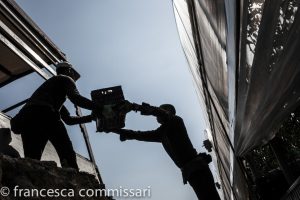
Read more
Blog, Rights, protection and inclusion
The Italian Plan for Regularisation: Real progress for migrants’ rights?
Since Covid-19 hit Italy, regularisation for undocumented migrants was seen as important not only to protect migrant workers’ rights but also to counter their vulnerability to contagion. Regularisation agreed in May 2020 is a...
Covid-19 has turned the Italian political debate on immigration upside down. On May 2020, the Italian government approved a new plan to temporarily regularise up to 200,000 undocumented migrants who are working or have worked in the past in the agricultural sector or as care-workers. Rather than as a threat or danger, a regularisation for undocumented migrants was framed as necessary to prevent the collapse of agricultural production and protect public health.
Proposed by centre-left parties within the governing coalition, the regularisation was eventually approved by the coalitions’ largest party, the populist Five Star Movement (M5S), despite its initial opposition.
The regularisation raises important questions about Italian immigration policy and politics: how and why the debate on regularisation emerged? How has it reconstructed the positions of the main Italian parties on the issue? And what policy dilemmas remain unresolved?
The underlying paradoxes of Italian migration politics and policies and the impact of covid-19.
The regularisation followed a five-year period during which Italian immigration politics was highly politicised and dominated by a narrow focus on boat arrivals and the reception of asylum-seekers. This narrow focus was largely an effect of the radical right Lega’s effective ownership of the immigration issue, and of its leader Matteo Salvini’s capacity to shape political debate, particularly between 2018 and 2019, when the Lega was in government and Salvini was Interior Minister.
Paradoxically, after 2017 inflows of asylum-seekers returned to historically low levels and form only a relatively small sub-section of total immigration to Italy.
An effect of the politicisation of immigration was to prevent Italian governments from resolving key underlying policy dilemmas related to the increasing ‘irregularisation’ of immigration to Italy. Irregularisation was fuelled by the absence of routes for legal migration from outside the EU combined with both a supply of migrants and demand for their labour in sectors of the Italian economy such as agriculture and domestic care. Salvini’s anti-immigration “Security Decree” exacerbated the situation and led to a further increase in the number of irregular migrants.
Despite the ‘refugee crisis’ in 2015-16, in Italy as in the rest of the EU, the main political parties avoided the underlying policy dilemmas. Since its formation in September 2019, the government led by Prime Minister Giuseppe Conte, founded on a heterogeneous coalition between the centre-left and the M5S, preferred to avoid the immigration issue and did not make good on its initially declared intention of amending Salvini’s Decrees.
The Covid-19 pandemic meant that many foreign workers in Italy were left to fend for themselves without basic protection against Covid-19 in rural ghettoes predominantly in Southern Italy where the caporalato (gangmaster) system based on the illegal recruitment of (mainly migrant) workers for agricultural labour with low pay and often slavery-like conditions is particularly widespread. Their undocumented status clearly discourages any communication with local authorities about potential Covid-19 cases.
At the same time, the Italian agri-food production and distribution, which relies heavily on the employment of seasonal migrant labour force, was affected by the closure of European borders, particularly those with Eastern Europe that choked off routes for seasonal workers.
The farmers union Coldiretti estimated a potential shortage of 200,000 seasonal workers while others put the number at 370,000. An employer survey revealed that 40 percent of agri-food companies were experiencing labour shortages. Food production losses, coupled with an increasing demand for fruit and vegetables during the lockdown led to significant increase in food prices.
Debate within the Italian government
The main supporter of an extensive regularisation policy for migrant workers was the Agriculture Minister, Teresa Bellanova, a former trade union leader and for long a prominent voice in the fight against caporalato. Bellanova is a member of the Italia Viva founded in September 2019 by former Prime Minister Matteo Renzi. Within the government, Italia Viva framed regularisation mainly in economic terms and in line with Renzi’s attempt to position his party at the centre of the political spectrum and align with business interests. Regularisation provided Renzi the opportunity to offset poor polling by influencing the government’s agenda and raising his and his party’s visibility.
The main centre-left party, the Partito Democratico and the smaller left-wing Sinistra Italiana supported Bellanova’s proposal, framing regularisation as necessary to protect migrants’ rights, their health and public health more broadly.
The M5S initially opposed the reform. M5S stances on immigration over the past decade have generated a seemingly endless debate among academics on the party’s ideological positioning. The party’s support for Salvini’s tough immigration policies led some scholars to conclude that the M5S was ‘an anti-immigrant far right party’. Others have argued that the party’s positioning is ‘ambiguous’.
Somewhat confusingly, the M5S Undersecretary to the Ministry of the Interior Carlo Sibilia explained initial M5S scepticism about the regularisation. On the one hand he claimed regularisation is a “policy which is typically favoured by the radical right”, which “involves a treatment of migrants as mere numbers” and would effectively condone employers of irregular migrants. On the other hand, he claimed that the policy would fuel radical right propaganda giving them the opportunity to attack the government for prioritising immigrants over Italians.
Why was the current plan approved?
While the Covid-19 crisis provided the backdrop, three factors influenced both the debate within the coalition and the wider political debate about regularisation.
First, the salience of the immigration issue has declined. Since 2015, immigration was constantly among the top priorities of European voters, but has fallen back dramatically as the pandemic dominates debate.
Second, mobilisations by the radical right opposition were largely ineffective. Shaken by poor polling, the Lega together with the other Italian radical right party, Fratelli d’Italia, campaigned against Bellanova’s plan giving Salvini a chance to shift the terms of political debate back to the immigration issue that his party had effectively owned for the previous five years. This mobilisation was constrained by the short period of time for debate compounded by the ever present health crisis. Physically mobilizing people around the regularisation of undocumented migrants was clearly more difficult. Populism without the physical presence of ‘the people’ proved difficult.
Third, pressure came from a ‘lobby of the weak’ an expression used to describe the ‘strange alliance’ in the early 2000s of employers’ organizations, Catholic NGOs and trade unions that effectively pushed Berlusconi’s centre-right governments to introduce amnesties for irregular migrants. Nearly two decades later, the Covid-19 crisis opened a window of opportunity for the business sector and advocacy NGOs to have greater influence on policy-making.
A core dilemma remains unresolved highlighted by the recent decision of the Italian government to block NGOs involved in search and rescue operations in the Mediterranean. The Conte government has being trying to send ‘control signals’ targeted at perceived ‘unwanted’ forms of immigration such as asylum-seeking to create political space for the regularisation plan. This approach is risky because it could re-focus public attention on Mediterranean crossings and irregular migration thus favouring the radical right and once again legitimising its claims and agenda.
Andrea Pettrachin Research Associate, Migration Policy Centre, EUI
The EUI, RSCAS and MPC are not responsible for the opinion expressed by the author(s). Furthermore, the views expressed in this publication cannot in any circumstances be regarded as the official position of the European Union.

